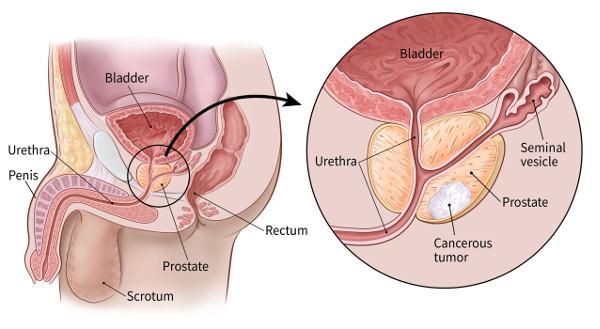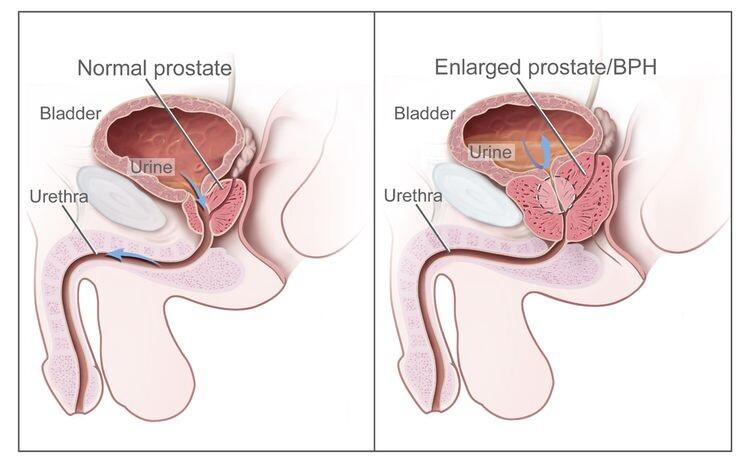Prostate cancer is the most common cancer among men (after skin cancer), but it can often be treated successfully. If you have prostate cancer or are close to someone who does, knowing what to expect can help you cope. Here you can find out all about prostate cancer, including risk factors, symptoms, how it is found, and how it is treated.
What is Prostate Cancer?
Cancer starts when cells in the body begin to grow out of control. Cells in nearly any part of the body can become cancer cells, and can then spread to other areas of the body.
Prostate cancer begins when cells in the prostate gland start to grow out of control. The prostate is a gland found only in males. It makes some of the fluid that is part of semen.
The prostate is below the bladder (the hollow organ where urine is stored) and in front of the rectum (the last part of the intestines). Just behind the prostate are glands called seminal vesicles that make most of the fluid for semen. The urethra, which is the tube that carries urine and semen out of the body through the penis, goes through the center of the prostate.
The size of the prostate can change as a man ages. In younger men, it is about the size of a walnut, but it can be much larger in older men.

Types of prostate cancer
Almost all prostate cancers are adenocarcinomas. These cancers develop from the gland cells (the cells that make the prostate fluid that is added to the semen).
Other types of cancer that can start in the prostate include:
- Small cell carcinomas
- Neuroendocrine tumors (other than small cell carcinomas)
- Transitional cell carcinomas
- Sarcomas
These other types of prostate cancer are rare. If you are told you have prostate cancer, it is almost certain to be an adenocarcinoma.
Some prostate cancers grow and spread quickly, but most grow slowly. In fact, autopsy studies show that many older men (and even some younger men) who died of other causes also had prostate cancer that never affected them during their lives. In many cases, neither they nor their doctors even knew they had it.
Signs and Symptoms of Prostate Cancer
Signs of prostate cancer include a weak flow of urine or frequent urination.
These and other signs and symptoms may be caused by prostate cancer or by other conditions. Check with your doctor if you have any of the following:
- Trouble starting the flow of urine.
- Frequent urination (especially at night).
- Trouble emptying the bladder completely.
- Weak or interrupted (“stop-and-go”) flow of urine.
When prostate cancer is detected in an advanced stage, symptoms may include:
- Pain in the back, hips, or pelvis that doesn’t go away.
- Shortness of breath, feeling very tired, fast heartbeat, dizziness, or pale skin caused by anemia.
Other conditions may cause the same symptoms. As men age, the prostate may get bigger and block the urethra or bladder. This may cause trouble urinating or sexual problems. The condition is called benign prostatic hyperplasia (BPH), and although it is not cancer, surgery may be needed. The symptoms of benign prostatic hyperplasia or of other problems in the prostate may be like symptoms of prostate cancer.

Prostate Cancer Risk Factors
A risk factor is anything that raises your risk of getting a disease such as cancer. Different cancers have different risk factors. Some risk factors, like smoking, can be changed. Others, like a person’s age or family history, can’t be changed.
But having a risk factor, or even several, does not mean that you will get the disease. Many people with one or more risk factors never get cancer, while others who get cancer may have had few or no known risk factors.
Researchers have found several factors that might affect a man’s risk of getting prostate cancer.
Age
Prostate cancer is rare in men younger than 40, but the chance of having prostate cancer rises rapidly after age 50. About 6 in 10 cases of prostate cancer are found in men older than 65.
Race/ethnicity
Prostate cancer develops more often in African American men and in Caribbean men of African ancestry than in men of other races. And when it does develop in these men, they tend to be younger. Prostate cancer occurs less often in Asian American, Hispanic, and Latino men than in non-Hispanic White men. The reasons for these racial and ethnic differences are not clear.
Geography
Prostate cancer is most common in North America, northwestern Europe, Australia, and on Caribbean islands. It is less common in Asia, Africa, Central America, and South America.
The reasons for this are not clear. More intensive screening for prostate cancer in some developed countries probably accounts for at least part of this difference, but other factors such as lifestyle differences (diet, etc.) are likely to be important as well. For example, Asian Americans have a lower risk of prostate cancer than White Americans, but their risk is higher than that of men of similar ethnic backgrounds living in Asia.
Family history
Prostate cancer seems to run in some families, which suggests that in some cases there may be an inherited or genetic factor. Still, most prostate cancers occur in men without a family history of it.
Having a father or brother with prostate cancer more than doubles a man’s risk of developing this disease. (The risk is higher for men who have a brother with the disease than for those who have a father with it.) The risk is much higher for men with several affected relatives, particularly if their relatives were young when the cancer was found.
Gene changes
Several inherited gene changes (mutations) seem to raise prostate cancer risk, but they probably account for only a small percentage of cases overall. For example:
- Inherited mutations of the BRCA1 or BRCA2 genes, which are linked to an increased risk of breast and ovarian cancers in some families, can also increase prostate cancer risk in men (especially mutations in BRCA2).
- Men with Lynch syndrome (also known as hereditary non-polyposis colorectal cancer, or HNPCC), a condition caused by inherited gene changes, have an increased risk for a number of cancers, including prostate cancer.
Other inherited gene changes can also raise a man’s risk of prostate cancer.
Factors with less clear effects on prostate cancer risk
Diet
The exact role of diet in prostate cancer is not clear, but several factors have been studied.
Men who eat a lot of dairy products appear to have a slightly higher chance of getting prostate cancer.
Some studies have suggested that men who consume a lot of calcium (through food or supplements) may have a higher risk of developing prostate cancer. But most studies have not found such a link with the levels of calcium found in the average diet, and it’s important to note that calcium is known to have other important health benefits.
Obesity
Being obese (very overweight) does not seem to increase the overall risk of getting prostate cancer.
Some studies have found that obese men have a lower risk of getting a low-grade (slower growing) form of the disease, but a higher risk of getting more aggressive (faster growing) prostate cancer. The reasons for this are not clear.
Some studies have also found that obese men may be at greater risk for having more advanced prostate cancer and of dying from prostate cancer, but not all studies have found this.
Smoking
Most studies have not found a link between smoking and getting prostate cancer. Some research has linked smoking to a possible small increased risk of dying from prostate cancer, but this finding needs to be confirmed by other studies.
Chemical exposures
There is some evidence that firefighters can be exposed to chemicals that may increase their risk of prostate cancer.
A few studies have suggested a possible link between exposure to Agent Orange, a chemical used widely during the Vietnam War, and the risk of prostate cancer, although not all studies have found such a link. The National Academy of Medicine considers there to be “limited/suggestive evidence” of a link between Agent Orange exposure and prostate cancer.
Inflammation of the prostate
Some studies have suggested that prostatitis (inflammation of the prostate gland) may be linked to an increased risk of prostate cancer, but other studies have not found such a link. Inflammation is often seen in samples of prostate tissue that also contain cancer. The link between the two is not yet clear, and this is an active area of research.
Sexually transmitted infections
Researchers have looked to see if sexually transmitted infections (like gonorrhea or chlamydia) might increase the risk of prostate cancer, because they can lead to inflammation of the prostate. So far, studies have not agreed, and no firm conclusions have been reached.
Vasectomy
Some studies have suggested that men who have had a vasectomy (minor surgery to make men infertile) have a slightly increased risk for prostate cancer, but other studies have not found this. Research on this possible link is still under way.

